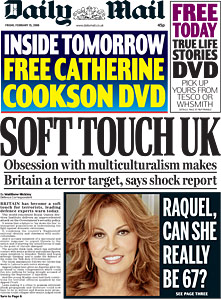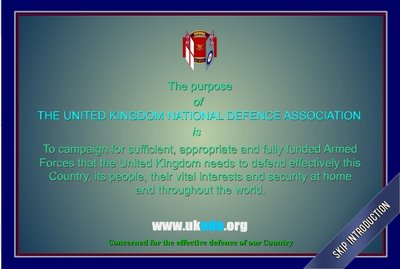How churnalism works over the RUSI report, and other thoughts on it.
 I keep trying not to return to Nick Davies' Flat Earth News (review tomorrow, hopefully) but another of its main accusations, that journalism is increasingly reliant on PR, is borne out by the rather hefty coverage given to an otherwise reasonably unremarkable essay in the Royal United Services Institute journal. Written by Gwyn Prins and Robert (formely Lord) Salisbury, it opens with the statement (PDF) "[T]he security of the United Kingdom is at risk and under threat" and continues on, tediously and with little sublety, to its conclusion. As I said, unremarkable. If it had been published without being presumably sent, either to the Press Association or to the newspapers themselves, only defence or security correspondents would have been likely to have noticed it, let alone reported it.
I keep trying not to return to Nick Davies' Flat Earth News (review tomorrow, hopefully) but another of its main accusations, that journalism is increasingly reliant on PR, is borne out by the rather hefty coverage given to an otherwise reasonably unremarkable essay in the Royal United Services Institute journal. Written by Gwyn Prins and Robert (formely Lord) Salisbury, it opens with the statement (PDF) "[T]he security of the United Kingdom is at risk and under threat" and continues on, tediously and with little sublety, to its conclusion. As I said, unremarkable. If it had been published without being presumably sent, either to the Press Association or to the newspapers themselves, only defence or security correspondents would have been likely to have noticed it, let alone reported it.To be fair to Daniel Sherman, who appears to be RUSI's "media inquiries" person, or aka, most likely the PR head, the word "multiculturalism" doesn't appear in the press release. Neither does "soft touch". Both however, made the headline splash on the front page of the Daily Mail. Having been provided with the release, the Mail hack responsible likely sped-read through the essay, saw the word multiculturalism, with features only around three times and isn't one of the main points of the article, then soft-touch, which features once, and from there the front page loomed. It after all made a change from earlier in the week, when the tabloids almost as a whole have been going crazy about how our youth are going to hell in a handcart, Britain is binging itself to oblivion and how we're all going to die. That it's been half-term week, when kids themselves are more likely to be taking notice of the media makes this especially repellent.
This was then from one hardy perennial to another. As Davies in FEN writes, these sort of press releases and articles are perfect for the lazy journalist or the time-stretched hack alike. They enable them to use large amounts of copy and paste, add very little of any other real substance, and they don't have to bother to check any of the information. If they had, they might have noticed that the essay notes onerously about the threat posed by Russia, especially the "unprecedented 2007 cyber-attack on Estonia, in which state resources were apparently complicit." Sorry to break it to the Russiaphobes and pessimists scaremongering about a new cold war, but the attack on Estonia has been traced back to the almost cliched just out of teenage years man within Estonia itself, who commanded what must have been a huge botnet.
Debate has then revolved around the two things that the essay doesn't really dwell on. Yes, it talks about "the United Kingdom presenting itself as a target, as a fragmenting, post-Christian society" with that "fragmentation worsened by the firm self-image of those within it who refuse to integrate" with the problem worsened still "by the lack of leadership from the majority which in mis-placed deference to multiculturalism failed to lay down the line to immigrant communities" but this isn't within the section where the authors outline the threats to security as they see them. The simple reply to that in any case is that we are presenting ourselves as a target, not because we're a post-Christian society or a soft-touch, but because we've involved ourselves in wars where some blowback was inevitable. Even the most ardent of those warning about the extremism in our midst admit that certainly prior to 9/11 and even up until the Iraq war there was something approaching an unwritten article of understanding where we allowed "them" to get on with it as long as Britain itself was not the target. If 9/11 changed everything, then so did the Iraq war. It's not as if this extremism is contained only in countries where the multicultural approach is always in evidence; an increasing number of attacks have been foiled in both America and in Europe, mainly targeting American installations if the country itself isn't involved in the operations in either Afghanistan or Iraq. The underlying point of the essay is that we haven't beaten into the lousy immigrants that they can't do whatever the hell they like here, which is errant nonsense.
The essay also says that "[7/7] exposed the weakness of the ‘multi-cultural’ approach towards Islamists", but did it really? Sure, to those already opposed in principle to "multiculturalism", which is and has never been an actual policy but something that has occurred naturally over time, it enabled them to point the finger, but wasn't its real message that regardless of race, religion or any other signifer, if someone wants to commit an act of mass murder, for whatever ridiculous, disengenuous and despicable reason, they will do so? As under Brown the government has moved towards, the right approach is to remove whatever pretentious, vacuous title these men give themselves, in Mohammad Siddique Khan's case that he was a "solider", and instead make clear what they are: self-righteous criminals killing innocent civilians for their own selfish, qausi-religious reasons. Of course they're jihadists, but the bottom line isn't Islam, but rather pure hatred, whether it's of modernity or otherwise.
Here's the paragraph on how we're a "soft-touch":
The deep guarantee of real strength is our knowledge of who we are. Our loss of cultural self-confidence weakens our ability to develop new means to provide for our security in the face of new risks. Our uncertainty incubates the embryonic threats these risks represent. We look like a soft touch. We are indeed a soft touch, from within and without.
But there is again no real evidence to back this up. We've long been an apathetic nation; around the only time we ever reach consensus is when we reach the finals of a football tournament, and then it's on what round we'll reach before we lose on penalties. Even that one time that everyone harks back to, the Blitz, has been convienently sanitised, like the occasions when the Queen Mother, touring parts of the East End to offer her supposed morale support, was booed, hissed and even pelted with rubbish. Nationalism in England is dead and racist nationalism is approaching terminal illness, while in Scotland and Wales it's currently living a charmed life that seems unlikely to prosper in the long-term. A better way to describe our existence would be atomised, not fragmented; we're still patriotic, just not in the queasy way America is. Point is, do we want to become that sort of nation? I, for one, hope not (Jeremy Seabrook also expands on this on CiF). It's also ridiculous we're a soft touch on terrorism: the almost unabated battles over the threat to civil liberties posed by legalisation meant to tackle terrorism are testament to that.
What the antics of the press over the essay have somewhat obscured is that while it is on the side of fearmongering over the threats we face, its actual proposals for tackling, isolating and identifying them are reasonably sound. It calls for two parliamentary committes, once including ministers as members, and a joint one of both the Commons and Lords. These committees would
draw together all the threads of government relating to defence and security, whether at home or abroad. It would be ‘somewhere for anyone to go’ in raising concerns. It would draw all parts of government into strategy and planning, as required. Its key function would be strategic: assessing risks and threats, and our capabilities in addressing them, in order to make judgements as to the balance and proportions of policy across the full spectrum of government activity.
This is a both a sensible and welcome suggestion. It should at the least be considered.
Less welcome is one of the other underlying emphasises. It opens with a nod towards the five former chief of defence staffs in the Lords that condemned the government for not spending enough on the military, and references them at least once again. Indeed, one of those who contributed through the "private seminars" that helped to draw up the essay is none other than Lord Inge, also a member of the UK National Defence Assocation and one of those that cried loudly and longly about the behaviour of Gordon Brown especially. Most of the others at these seminars were either ex-spooks, ex-military men or academics. As Garry has identified, it does again all come down to the money. As well as the other interests I noted that members of the UK National Defence Assocation had at the time, Vice Admiral Sir Jeremy Blackham, one of those on the list at the end of the essay, was formely the UK president of EADS, "a global leader in aerospace, defence and related services," and is now a senior military adviser to the company. There's Sir Mark Allen, a retired member of the UK diplomatic service, which is usually code for having been a spook, who's a senior adviser to BP. Garry notes that Robert Salisbury, previously Viscount Cranborne, co-author of the report, "quit" the Lords because of the "onerous" rules on interests. Finally, Baroness Park of Monmouth, who at least admits to formely working for MI6, is the vice-patron of the Atlantic Council, which has this upcoming event advertised on its website:
On April 21st, at the Ritz Carlton, Washington DC, the Atlantic Council will present former British Prime Minister Tony Blair the Award for Distinguished International Leadership—and will also present awards to Rupert Murdoch of News Corporation and Admiral Michael Mullen, Chairman of the Joint Chiefs of Staff, for Distinguished Business and Distinguished Military Leadership respectively.
Richly deserved, don't you think?
There's nothing wrong with calling for increased defence spending of course, especially when we continue to have such damning coroners' reports on those who've been killed in both Iraq and Afghanistan. If you're going to though you ought to at least declare your interests, and those involved in both this and previously the UKNDA have hardly been upfront about it. It's also a handy coincidence that this report about Britian being a soft-touch was published on the same day that the threats made by both BAE and Saudi royals were exposed in court. The government plainly gave in to blackmail over the Serious Fraud Office slush fund investigation, something it would have never done to terrorists. The reality is that we're a soft-touch when it comes to the fabuously rich, the arms dealers and the Sharia-law enforcing Saudi royals, not to those who threaten us in our backyard.
Labels: Daily Mail-watch, defence, defence spending, Mail-watch, multiculturalism, RUSI, terror, terror laws, UK National Defence Association


